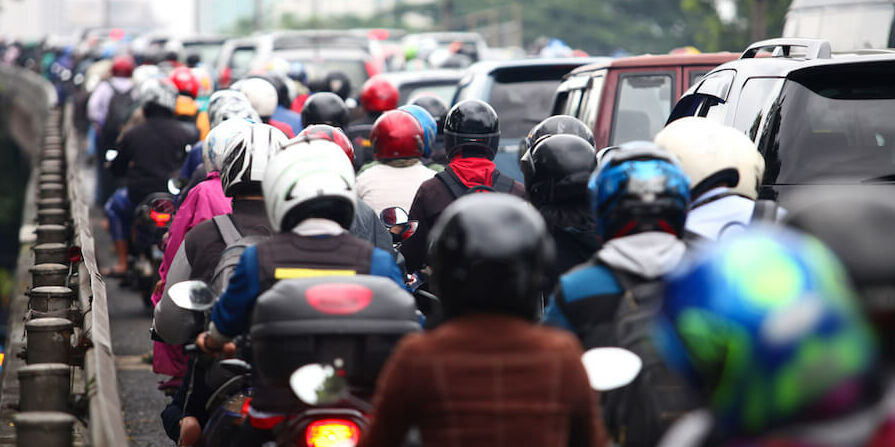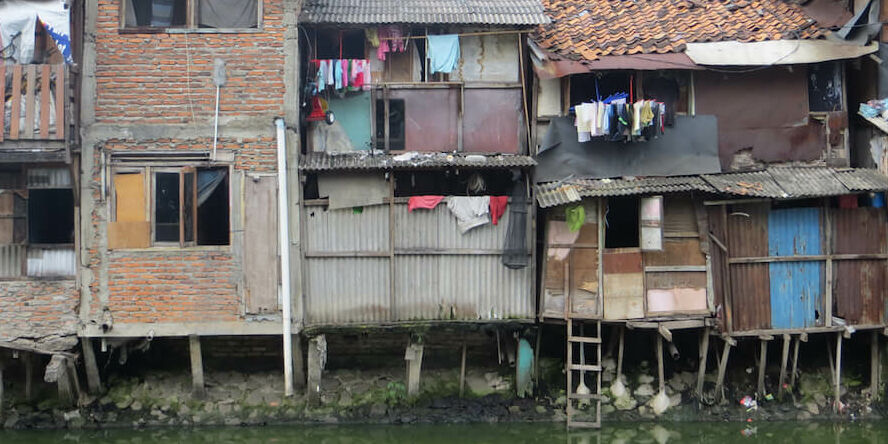Who owns the city?
The Indonesian saying Tua di Jalan, which translates as "growing old on the streets," describes the daily marathon of patience needed to endure Jakarta’s traffic. The perpetual gridlock in Indonesia’s capital shapes the rhythm of the metropolis and the everyday lives of its inhabitants.
"The proportion of the city devoted to green space has shrunk from 35 % in 1983 to only 6 % today. Thus, public space is reserved primarily for residents with sufficient purchasing power, while excluding everyone else."
Those who can afford to do so take a break from the grind by heading for one of the megacity’s 180 shopping malls. These temples of consumption feature exclusive European fashions, international restaurants, and enormous pay-to-play areas, some of which are as large as outdoor playgrounds and come equipped with Ferris wheels, bumper cars, and skating rinks. Many malls also offer exhibitions and hobby courses, since—for lack of a better alternative—they have become the primary public spaces in Jakarta. By contrast, public parks, playgrounds, and even accessible sidewalks have become rather rare. The proportion of the city devoted to green space has shrunk from 35 per cent in 1983 to only 6 per cent today. Thus, public space is reserved primarily for residents with sufficient purchasing power, while excluding everyone else. Public services such as education, transportation, and water hookups are following the trend toward increasing privatization.
As the old residential areas vanish, so too do the social and communications networks as well as the principle of mutual support that used to sustain them (gotong royong).
The situation on real estate markets also tends to exclude the less affluent. Downtown Jakarta increasingly has become the domain of expensive office complexes and luxury apartments, while traditional neighborhoods (kampungs) are disappearing from the urban landscape, its inhabitants forced to move to the city’s periphery. As the old residential areas vanish, so too do the social and communications networks as well as the principle of mutual support that used to sustain them (gotong royong). Indonesia’s president, Joko Widodo (also known as Jokowi) has always advertised these institutions as the essence of the Indonesian society and nation.
Among other responses to this trend, since 2005 Indonesia has pursued the so-called "1000 Towers Project," the declared goal of which was to construct high-rise apartment buildings for low-income people. However, private investors have exploited vagueness in the laws governing real property to build even more high-end dwellings, while even the more modest apartments can be purchased only by those customers whose financial situation enables them to qualify for bank loans.
Smart city vs. social city
Jakarta’s governor, Basuki Tjahaja Purnama – usually called Ahok – is known for his tough demeanor as well as his reputation for getting things done, including the progressive modernization of his city. The previous governor, Jokowi, had been a popular, progressive, self-made man with the common touch.
When Jokowi was nominated for president and subsequently elected in 2014, Ahok, as his deputy, was promoted to his current position. The Christian and ethnic Chinese Ahok is viewed as a mover and shaker who can be trusted to carry out ambitious and urgently needed infrastructure projects in Jakarta.
Besides the city’s sewer system, the best example of such projects is the subway, planned for 20 years and now once again under construction. If and when it is completed, it would be the most effective antidote to the megacity’s daily gridlock.

Thus, the incumbent governor has been credited by nearly everyone, regardless of religion, ethnicity, or social class, with having made the city administration more efficient. Furthermore, corruption on his watch allegedly has decreased, city sanitation has improved, annual flooding has been reduced drastically, and the heavily polluted urban Ciliwung River has been cleaned up.
"Data protection and—especially—the social aspects of urban development are being put on the back burner as the city’s social functions are de-emphasized."
At his official residence, Ahok proudly shows visitors his newly launched "Jakarta Smart City Control Room." Directly above his office, up to 90 employees evaluate data from video cameras set up across the city as well as monitoring incoming reports from so-called “netizens,” all displayed on an oversized control screen. On the one hand, the futuristic control center reflects the fascination with and attraction to technology that is widespread all over Asia. And indeed smartphones and IT-applications can make everyday life easier, especially when the existing infrastructure is decrepit. On the other hand, the control room makes it obvious that Jakarta’s governor, like many other city fathers in Asia, views neighboring Singapore as his model. Yet the Smart City concept primarily pleases technology and construction interests as well as some other private investors. By contrast, data protection and—especially—the social aspects of urban development are being put on the back burner as the city’s social functions are de-emphasized. Still, Ahok has been highly popular among the urban middle class because of his no-nonsense approach.
Near the end of September, 2016, Ahok, citing the Koran, exhorted Muslims not to fall for the argument that they should refuse to vote for him on account of his religion. But his effort to score points with the (Muslim) public backfired, because various Islamic and Islamist groups, not to mention his rivals in the election for the governor’s office, hinted that he was guilty of blasphemy. As social tensions mounted, these accusations led to the official indictment of the incumbent governor and (in May of 2017) his conviction and sentencing to two years in prison. What is more, several mass demonstrations over the Ahok affair were staged in Jakarta, although their organizers have not been clearly identified. The political ramifications of Ahok’s legal troubles for the entire country remain to be seen.
It should be noted, however, that Ahok previously had taken measures that earned him considerable criticism, although certainly not to the same extent as did the blasphemy charge. He ordered the eviction of the residents of poor neighborhoods, calling in the police and even the military to force the residents out of their homes.
At the United Nations conference in Quito (October, 2016) known as Habitat III, devoted to the issue of "dwelling and sustainable development," Indonesia presented a national report in which it is stated that protection from forced evictions is a civil right and that such evictions had declined dramatically in that country. Nevertheless, the government agencies in charge defended the supposed exceptions in Jakarta as flood-prevention measures or as part of a “no slum policy.” According to estimates by the Jakarta Legal Aid Foundation, in the last two years alone more than 16,000 low-income families in the city have lost their homes. Only 30 % of them have been offered alternative accommodations. The resulting intensification of social divisions is one reason why Ahok has long been such a polarizing figure, quite apart from his lack of diplomatic sensitivity. Finally, his support for big, high-end construction projects stokes prejudices against the ethnic Chinese minority and its allegedly privileged position in the Indonesian economy.
The desire for a more inclusive city
In reaction to Ahok’s policies, recent events sponsored by Indonesian NGOs have expressed the desire for a more livable, inclusive, and socially-conscious city. It is claimed that he lacks a holistic vision, whether in terms of urban planning or social and cultural values, for the increasingly exclusive Jakarta. According to the Indonesian vice-minister of culture Hilmar Farid (a former history professor and political activist), the scheme for a "social city" would dovetail nicely with President Jokowi’s goal of developing the country "from the periphery inward." That principle could be adapted to the city, where people on the margins of society were supposed to be helped. Furthermore, Farid advised that we should regard culture as an important instrument for transforming the city in the future. People in Jakarta live on different cultural and historical foundations (layern) from pre-colonial and colonial to modern, and private-capital-driven, all of which need to be connected. In the context of an integrated scheme of urban development, artists could play a key role alongside city planners. Last but not least, Farid, who as a follower of Jokowi now holds political office for the first time, has joined Indonesian urban development experts in advocating greater citizen involvement at the grassroots.
"Urban planning is far more than merely a politically neutral, purely technical matter. [T]he competition between political camps and their ideologies is reflected in the cityscape itself."
The development of Korea’s capital, Seoul, demonstrates in impressive fashion how things can be different. There, the progressive mayor, Park Won-Soon has—in his own words—initiated a deliberate paradigm shift since taking office in 2011. Instead of abandoning Seoul to private investors as a "city of competition," he aims to transform the capital (the metropolitan area of which houses half of South Korea’s population) into an "inclusive city." By intervening at strategic points, he has tried to stake a political claim against those private investors to shape the city’s development. According to the testimony of Korean urban development experts and representatives of civil society, by encouraging greater citizen involvement and the reclamation of public spaces, the mayor and his aides really have succeeded in making Seoul noticeably more livable again. As one surveys the cityscape, one sees numerous indications of this paradigm shift, including new parks and meeting places, broad sidewalks, artists’ projects, services provided by the sharing economy, and initiatives to protect historic monuments.
Society-wide competition
For many people the city signifies hope for a better future and social advancement. Consequently, urban planning is far more than merely a politically neutral, purely technical matter. Thus, the competition between political camps and their ideologies is reflected in the cityscape itself, although not only there.
"By 2014, for the first time, more people were living in cities than in rural areas. By 2050 the proportion of city-dwellers among the global population is expected to rise to 66 per cent—in Asia even to 75 per cent"
The progressive urban administration of Seoul, with its concept of the "inclusive city," demonstrates in exemplary fashion that it intends to reclaim the city on behalf of its residents, to improve their quality of life. In Jakarta as in many other Asian cities, this is still the stuff of fantasy. For most of the neighboring countries of Asia, the presumed ideal of Singapore embodies the model of a highly efficient, highly technologically advanced "competition city."
By 2014, for the first time, more people were living in cities than in rural areas. By 2050 the proportion of city-dwellers among the global population is expected to rise to 66 per cent—in Asia even to 75 per cent. Nowhere else in the world are cities growing so rapidly as in Asia, and nowhere else are so many megacities forming. When politicians like Seoul’s Mayor Park, or—before him—Jokowi when he still governed Jakarta seek to control the main lines of development in their cities, their progressive, tolerant style of governance can set the political tone for the entire country.
"The development of Asia’s cities will reveal in microcosm the political course that may be set all around the globe."
Thus, much is at stake in the political competition over who will shape the destinies of Asia’s metropolitan areas: private investors and their pro-free-market backers, conservative and radical religious groups, or progressive politicians committed to developing socially-conscious, inclusive cities. Their rivalry increasingly impinges on society-wide issues of social cohesion, social justice and sharing, social mobility and equality of opportunity, environmental justice, and – last but not least – participatory democracy. The future is sure to bring rapid urbanization, of which Asia will have the lion’s share. Hence, the development of Asia’s cities will reveal in microcosm the political course that may be set all around the globe. In this context, integrated, socially responsible and therefore inclusive urban development in Asia would contribute mightily to the achievement of the UN’s Sustainable Development Goals (SDG’s) from Agenda 2030. ###
Sergio Grassi is the country director of Friedrich-Ebert-Stiftung in Indonesia and oversees the work of FES in Malaysia. This text was first published in Frankfurter Hefte/Neue Gesellschaft Heft 5|2017.
About FES Connect
Connecting people, in the spirit of social democracy, we source and share content in English from the German and international network of the Friedrich-Ebert-Stiftung.






